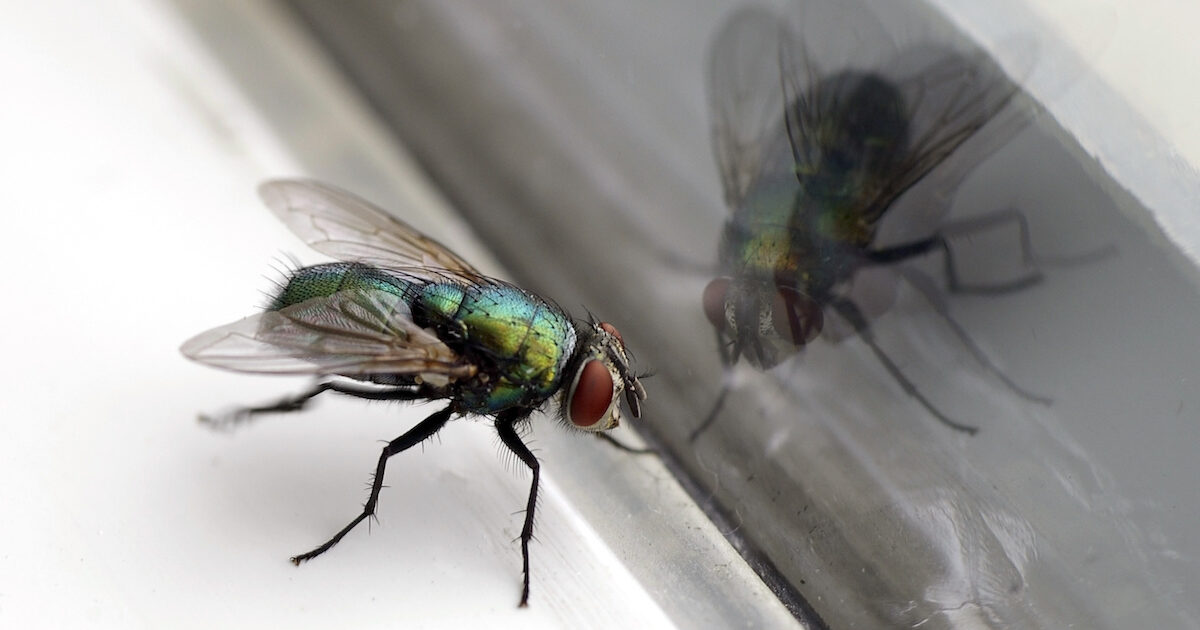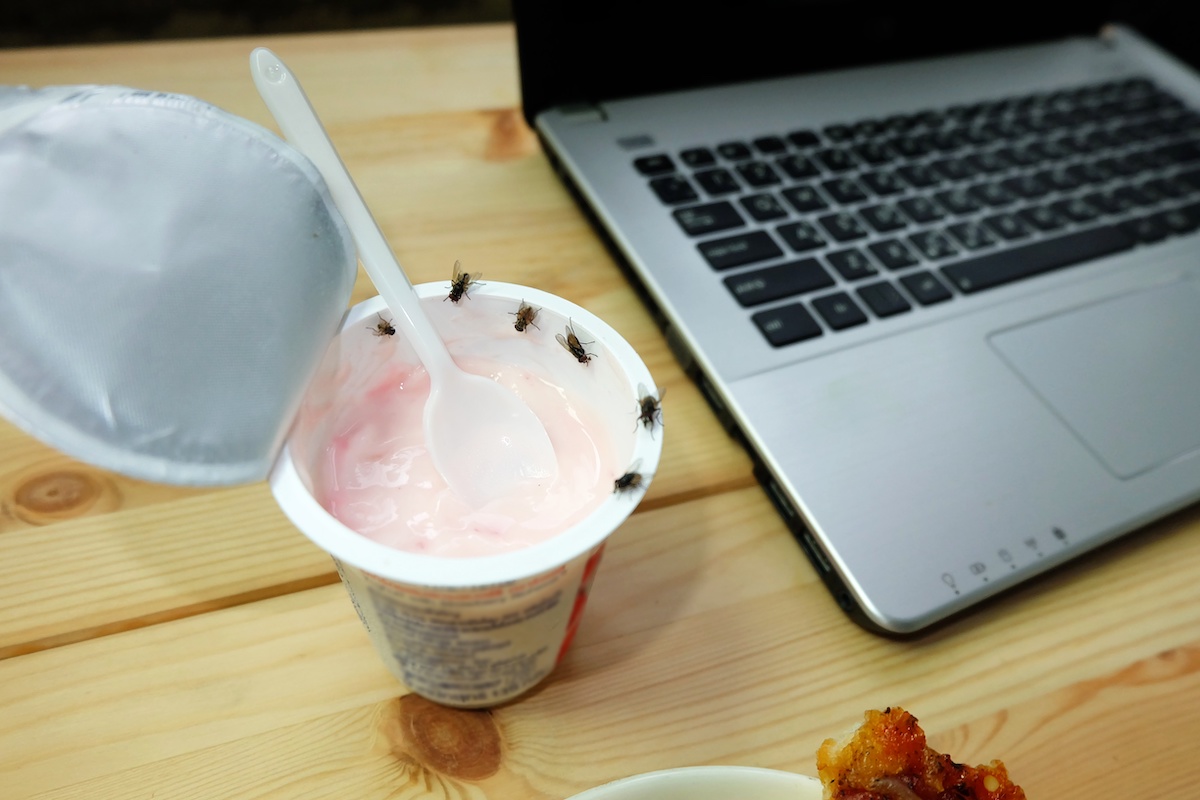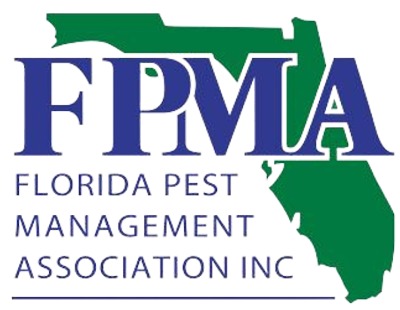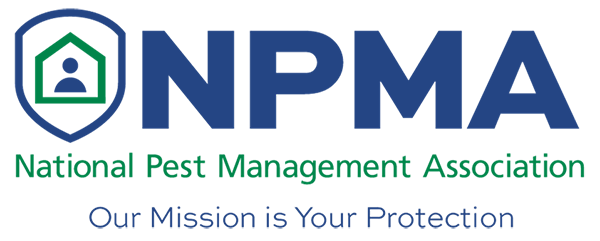
Wondering why you have flies in your house? Flies can pose serious health risks by spreading diseases like E. coli and salmonella, making their control more than a matter of mere annoyance. They can contaminate food and surfaces, leading to food poisoning and other health issues.
If you are trying to figure out why you have so many flies in your house, consider the following sources.
Decomposing Animals
When something like a rat dies in an inaccessible spot such as your attic or inside wall cavities, it may not be noticed until flies start appearing. As gruesome as it is, a decomposing body is a fly magnet.
- Life Cycle: Flies are attracted to decomposing organic matter to lay their eggs. A single carcass can breed hundreds of flies.
- Detection: You might notice an unpleasant odor or see flies congregating in areas near the decomposition.
- Prevention: Regularly inspect your home for any signs of pests that might die and decay. Sealing entry points for rodents can also prevent them from entering home spaces where they can die and cause issues.
This is a problem that often goes unnoticed until it’s too late. Keeping an eye on unusual fly activity can be a tell-tale sign of something decaying within hidden spaces. Removing the carcass and treating the area can drastically reduce fly numbers.
Fly Larvae in Potting Soil
Are you a plant lover? While plants can bring us joy and spruce up a space, they can also attract pests.
That’s because bringing new plants into your home can unintentionally introduce fly larvae. Potting soil, especially if stored improperly, can be a breeding ground for flies.
What to do if You Find Flies in Your Potting Soil
- Spotting the Source: If you notice flies soon after acquiring new plants, inspect the soil for larvae.
- Solution: Remove and replace the infested soil to eliminate the immediate source of flies. Dispose of the old soil safely to prevent spreading the larvae.
- Prevention Tips: When purchasing potting soil, opt for well-sealed, high-quality products and inspect plants before bringing them indoors.
Changing out infested soil and being vigilant about the quality of new plants and soil can keep your indoor garden pest-free!
Neglected Drains
Drains are easy to forget about. Unfortunately, kitchens and bathrooms are common fly breeding areas due to unnoticed buildups in drains. This is usually the result of rotting organic materials like fats, oils, and bacteria.
- Identifying the Issue: Slow-moving or foul-smelling drains are a sign of potential fly breeding sites.
- Cleaning Solutions: Regularly clean your drains with appropriate cleaners to dissolve organic matter and prevent fly breeding.
- Professional Help: For stubborn problems, consider hiring professionals who can provide more thorough cleaning and preventative treatments.
No one wants to find flies in their drain. Gross, right? Keeping your drains clean can help keep fly populations under control. Regular maintenance can prevent the buildup that attracts flies.
Overlooked Culprits: Forgotten Garbage and Recycling Bins
Discovering flies swarming around your garbage and recycling bins can be both annoying and embarrassing, especially when you realize that neglected waste is the cause. It’s a common oversight in busy homes, but the presence of flies can quickly escalate from a minor nuisance to a significant concern. The sensation of flies buzzing around every time you dispose of trash or the awkwardness of guests noticing them during a visit can make anyone feel uneasy and frustrated.

- Common Scenario: Flies are attracted to the odors emanating from rotting food scraps and other organic matter in your garbage and recycling bins.
- Visibility and Increase: You might notice flies particularly active on warmer days when bins are left out in the sun, speeding up the decomposition process and increasing fly activity.
- Preventive Actions: Regularly washing bins with a mixture of water and vinegar can help neutralize odors and deter flies. Ensuring lids are always securely closed also keeps flies out.
To tackle flies coming from garbage and recycling bins, consider implementing a routine cleaning schedule. Wash the bins out at least once a month or more frequently if you notice an increase in flies. Use a hose to rinse out bins and a brush to scrub away any residue. A mixture of hot water and vinegar or baking soda can be very effective in removing odors that attract flies.
Why do I Have Flies in my House? The Signs of a Fly Infestation
Detecting a fly infestation early can save you from bigger pest control problems down the road. Here are the clear indicators that flies have become more than just a passing nuisance in your home.
- Seeing more flies than usual around your home is a primary indicator of an infestation.
- If you spot flies frequently in your house, especially in specific areas, it might be time to investigate.
- Finding larvae, also known as maggots, particularly in waste areas, indicates a breeding ground.
- Flies tend to gather at windows or in lighted areas, which can signal an infestation inside.
Get Help with Fly Infestations from Drive-Bye Exterminators
Is your Tampa Bay home overrun with flies? Are you wondering why do I have flies in my house? Help is available from Drive-Bye Exterminators. Drive-Bye Exterminators is a family-owned pest control company with numerous awards for exceptional customer service. We specialize in both insect pest services providing extermination of unwanted household pests such as cockroaches, ants, termites, spiders, and, you guessed it–house flies.
Don’t let a fly infestation drive you crazy. Call us today for help!






